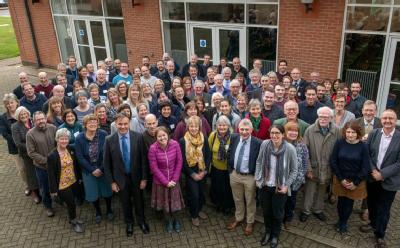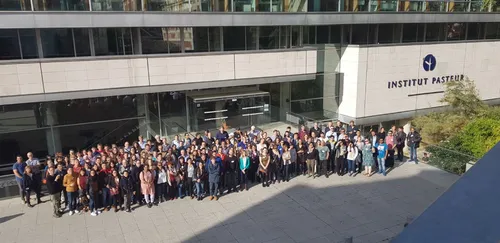Life Sciences News
See our Latest Journal Publications
Slime Santa beard likes hot peppers
 · A slime Santa beard has been made by Ian Hands-Portman at the University of Warwick’s School of Life Sciences
· A slime Santa beard has been made by Ian Hands-Portman at the University of Warwick’s School of Life Sciences
· The slime is a not a plant, animal or fungi it is a myxomycete, and feeds off oats, likes hot peppers, but doesn’t like chocolate
· Slime molds are useful to scientists and are being used to research cancer treatments as it is one cell with multiple nuclei, they also solve mazes and maps in a more efficient way than humans, so computer scientists are looking at using them for faster lower energy computers and sat-navs.
The Vegetables of Christmas Future
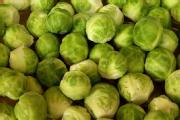 If you think about a traditional Christmas dinner, there’s turkey with pigs in blankets, or maybe you prefer a nut roast. But the rest is vegetables. A large proportion of our plate should be covered in vegetables, and the standard winter varieties, like carrots and sprouts, are grown very successfully in the UK.
If you think about a traditional Christmas dinner, there’s turkey with pigs in blankets, or maybe you prefer a nut roast. But the rest is vegetables. A large proportion of our plate should be covered in vegetables, and the standard winter varieties, like carrots and sprouts, are grown very successfully in the UK.
But will this always be the case? Climate change is bringing with it new challenges as well as making known pests and diseases more difficult to tackle. Scientists at Warwick's Crop Centre, are working to understand the pests and diseases of the some of the UK’s major crops and developing, using traditional plant breeding and genetic expertise, new resistant varieties.
How sand fly mating habits are helping tackle tropical disease in £2.5M project
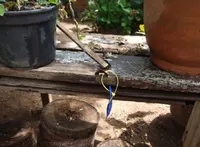 The tropical disease Leishmaniasis is being tackled by catching female sand flies who carry the parasite that causes the disease. Scientists led by Dr Orin Courtenay of Warwick University and Professor Gordon Hamilton of Lancaster University, developed the concept as part of a £2.5M project funded by The Wellcome Trust and published in PLOS Neglected Tropical Diseases.
The tropical disease Leishmaniasis is being tackled by catching female sand flies who carry the parasite that causes the disease. Scientists led by Dr Orin Courtenay of Warwick University and Professor Gordon Hamilton of Lancaster University, developed the concept as part of a £2.5M project funded by The Wellcome Trust and published in PLOS Neglected Tropical Diseases.
Superbugs, stem cells and more at University of Warwick’s showcase of science
 Whether you are fascinated by superbugs, stem cells, or circadian rhythms, a new programme of free events from the University of Warwick will give you the ideal vantage point on biological and medical science.'Science on the Hill' is a new programme of public engagement events jointly hosted by the School of Life Sciences and the Wellcome-Warwick Quantiative Biomedicine Programme at Warwick Medical School. These interactive two hour events taking place across the academic year will feature 20 researchers giving a birds-eye view of the latest exciting developments in their discipline.
Whether you are fascinated by superbugs, stem cells, or circadian rhythms, a new programme of free events from the University of Warwick will give you the ideal vantage point on biological and medical science.'Science on the Hill' is a new programme of public engagement events jointly hosted by the School of Life Sciences and the Wellcome-Warwick Quantiative Biomedicine Programme at Warwick Medical School. These interactive two hour events taking place across the academic year will feature 20 researchers giving a birds-eye view of the latest exciting developments in their discipline.
NERC CENTA DTP funded studentships are recruiting for PhD study for 2020/21 entry
CENTA stands for Central England NERC Training Alliance, a consortium of Universities and research institutes that are working together to provide excellence in doctoral research training within the remit of the Natural Environment Research Council. As a CENTA student, you will belong to a consortium well-resourced to provide you with extensive training to give you confidence in all aspects of your research.
PhD Project themes:
· Climate and Environmental Sustainability
· Organisms and Ecosystems
· Dynamic Earth
Deadline for applications: 10 January 2020
MIBTP Recruitment for 2020/21 entry is now open
The Midlands Integrative Biosciences Training Partnership (MIBTP) is a BBSRC funded doctoral training partnership between the University of Warwick, the University of Birmingham, the University of Leicester, Aston University and Harper Adams University.
The MIBTP has an ambitious vision to deliver innovative, world class research across the life sciences to boost the growing bio-economy in the Midlands and across the UK.
PhD studentship projects are focussed in vital research areas such as Sustainable Agriculture and Food, Understanding the Rules of Life, Renewable Resources and Clean Growth and Integrated Understanding of Health and uses interdisciplinary and quantitative approaches to biology.
Students from a wide diversity of academic backgrounds are encouraged to apply: those with creative drive in both theoretical disciplines (for example, maths, computer science, statistics) as well as experimental science (for example, biology, biomedicine, chemistry, biotechnology).
Deadline for applications: 12 January 2020
Going viral: What are bacteriophages and how can they help us?
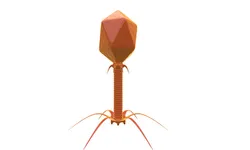 Antibiotics are going to stop working. Bacteria are developing resistance to the drugs we have to treat them and there is no doubt that without action getting an infection or having surgery is going to get a lot more risky. With a global health crisis on our hands, scientists across the world are now trying to find alternatives to the drugs which have kept us alive for the past decade.
Antibiotics are going to stop working. Bacteria are developing resistance to the drugs we have to treat them and there is no doubt that without action getting an infection or having surgery is going to get a lot more risky. With a global health crisis on our hands, scientists across the world are now trying to find alternatives to the drugs which have kept us alive for the past decade.
One possible solution is the use of bacteriophages.
Dr Antonia Sagona is working on understanding how phages fight infections.
The real Frozen: What can we do with ice?
Dr Hendrik Schafer and colleagues are looking at the microbial cycling of trace gases in sea ice as part of an international research programme called MOSAiC.
Read Knowledge Centre article
Synthetic Biology UK 2019
Synthetic Biology UK: 9-10 December 2019, University of Warwick
Synthetic biology is a convergence of multiple fields that can generate both improved understanding of biological systems as well as cutting-edge biotechnology. The establishment of six UK centres focused on synthetic biology has significantly enhanced growth of this area, and there is accordingly a sizeable community in this country working on a diversity of projects. In addition, there are many companies in the biotech and pharma sectors that are incorporating synthetic biology technologies into their R&D programmes. In response to this growth, the community initiated a series of annual SBUK conferences. These have so far been hosted by the respective Synthetic Biology Research Centres at Edinburgh, Manchester and Bristol.
Warwick Integrative Synthetic Biology Centre (WISB) pursues a diverse and distinctive research programme of synthetic biology research, with strengths in both experimental and computational aspects. We have strong links to other international synthetic biology centres, including in the USA, Germany, Estonia, Denmark, China and Brazil as well as to multiple international companies.
The fourth SBUK, to be held on Warwick campus, will feature a wide range of themes presented by colleagues from the UK and from abroad. It will appeal to researchers from many other fields because of the state-of-the-art technologies and wide range of organisms and challenges that will be discussed. Colleagues are encouraged to look at the programme and to consider joining us at what is expected to be an exciting and informative event.
UK Natural Light Growing Centre opened for business at Warwick’s Innovation Campus in Warwickshire
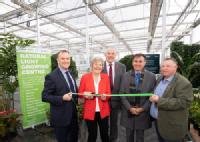 Agri-tech innovation centre Crop Health and Protection (CHAP) and its greenhouse innovation partner RIPE Building Services, have officially opened their new high-tech greenhouse facility at the University of Warwick’s Wellesbourne Campus.
Agri-tech innovation centre Crop Health and Protection (CHAP) and its greenhouse innovation partner RIPE Building Services, have officially opened their new high-tech greenhouse facility at the University of Warwick’s Wellesbourne Campus.
The structure, named the Natural Light Growing (NLG) Centre, has been designed and built by RIPE Building Services, partnered by CHAP with £500,000 funding from Innovate UK. It was officially opened by Professor Janet Bainbridge OBE.
Press release
Academic job opportunity: Associate Professor or Professor of Infection Microbiology
Applications are invited for an Associate Professor or Professor of Infection Microbiology to join our vibrant research and teaching community in the School of Life Sciences.
We particularly encourage applications from candidates who complement existing strengths in the School and who will lead research in the areas of laboratory based antimicrobial resistance and anti-infective discovery, the human microbiome, host-pathogen interactions and immunology, microbial genetics and chemical biology approaches to address human and animal infection.
Over £20 million government award marks Midlands’ bio-economy strengths
A consortium of Midlands research-active universities has just been awarded research studentships worth over £20 million to build on the Midlands’ already significant bio-economy and success in life sciences and agricultural research.
The Midlands Integrative Biosciences Training Partnership 2020 (MIBTP2020) is led by the School of Life Sciences at the University of Warwick and brings together a number of other Warwick research departments, in partnership with the University of Birmingham, the University of Leicester, Aston University and Harper Adams University. The funding comes from the Biotechnology and Biological Sciences Research Council arm of the Government’s UK Research and Innovation (UKRI) funding organisation. This award will be matched by the universities in the partnership to fund a total of 245 doctoral students (59 per year) over the next 5 years.
Seed collection conserves genetic diversity of vegetables
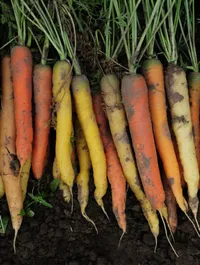 Listen to Dr Charlotte Allender discuss the need to conserve the genetic diversity of vegetables, and how this is being done at the University of Warwick's seed bank facility.
Listen to Dr Charlotte Allender discuss the need to conserve the genetic diversity of vegetables, and how this is being done at the University of Warwick's seed bank facility.
Radio discussion (28 Sept 2019)
The Warwick Genetic Resources Unit houses the UK Vegetable Genebank, a globally significant collection of around 14,000 seed samples of a range of vegetable crops.
Great Wall Symposium 2019
Bacterial cell biology researchers from across the world gathered at The Pasteur institute in Paris at the end of September to attend the 6th biennial Great Wall symposium organised by Professor David Roper and Professor Ivo Boneca (Pasteur). This three day meeting on all aspects of bacterial cell wall biosynthesis was attended by just under 200 interdisciplinary researchers on all aspects of bacterial cell wall microbiology.
Dr Adrian Lloyd from SLS provided an invited talk on his recently submitted research on 'Substrate and stereochemical control of cell wall crosslinking by E. coli PBP1B' as well as a posters from a number of Warwick PhD students from SLS and WMS.
Tracking Alzheimer’s disease pathology in single neuronal cells
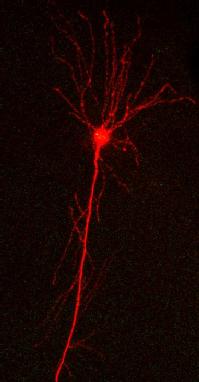 Researchers have developed a superior method to describe the very earliest effects that Alzheimer’s Disease proteins have on the properties of brain cells.
Researchers have developed a superior method to describe the very earliest effects that Alzheimer’s Disease proteins have on the properties of brain cells.
In the paper ‘Introduction of Tau oligomers into cortical neurons alters action potential dynamics and disrupts synaptic transmission and plasticity’ published in the journal eNeuro. Researchers directly identify new therapeutic targets and describe a new standard for future research activity.
How close are we to there being a British Baked Bean?
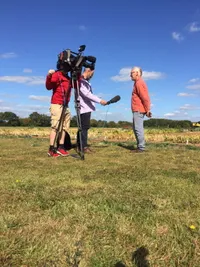 Dr David Gregory-Kumar from BBC Midlands Today reports on the harvest of the first full size field of a new variety of haricot bean bred by Professor Eric Holub for the UK's climate. Watch the report and read the press release
Dr David Gregory-Kumar from BBC Midlands Today reports on the harvest of the first full size field of a new variety of haricot bean bred by Professor Eric Holub for the UK's climate. Watch the report and read the press release
First milestone for IBRB
The Interdisciplinary Biomedical Research Building (IBRB) will be a new state-of-the-art research building on the Gibbet Hill campus that will bring together up to 300 biomedical researchers from across the School of Life Sciences and Warwick Medical School to fight human diseases.
Warwick rises a further two places to 77th in the THE World University Rankings
The University of Warwick has risen two places to 77th overall in the THE (Times Higher Education) 2019 World University Rankings published on the evening of Wednesday 11th September 2019. This rise is in addition to Warwick’s leap of a dozen places in the 2018 table.
Videos from First Labcut Workshop
 Funded by the Wellcome Trust and Warwick Quantitative Biomedicine Programme (WQBP), LabCut is a science film workshop run by SynBio CDT PhD students Cansu Kuey, Charlotte Gruender and Patrick Capel. The five films created during the inaugural workshop are now available to be viewed and will be screened during the British Science Festival in September. Find out more
Funded by the Wellcome Trust and Warwick Quantitative Biomedicine Programme (WQBP), LabCut is a science film workshop run by SynBio CDT PhD students Cansu Kuey, Charlotte Gruender and Patrick Capel. The five films created during the inaugural workshop are now available to be viewed and will be screened during the British Science Festival in September. Find out more

